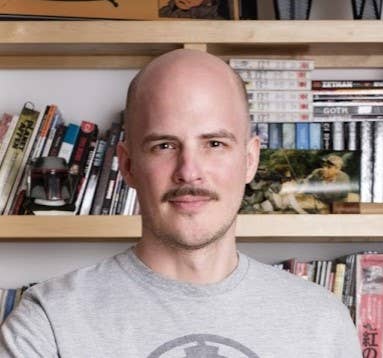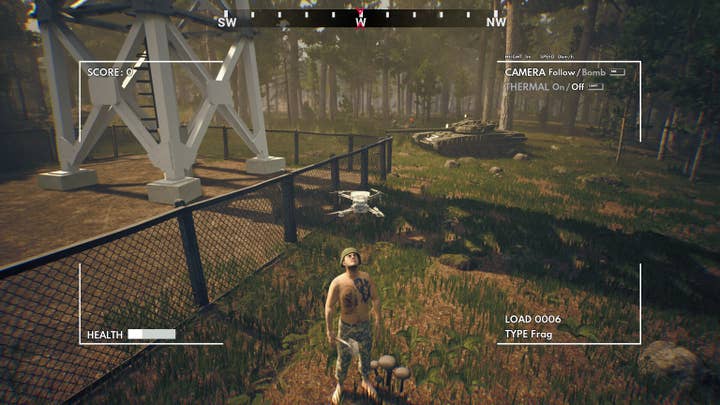The Lesser of one 'Evil'
Lesser Evil founder Hendrik Lesser talks about making "games that take a stand" and turning real-life tragedy into entertainment without trivializing it
Like many in the games industry, Hendrik Lesser wears multiple hats. But his specific collection of hats don't always fit neatly together.
"Many many years ago, I called myself the king of conflicts of interest," Lesser tells GamesIndustry.biz.
Lesser is the CEO of Remote Control Productions, a collective of 15 different game companies with more than 500 employees between them, some of which could be seen as competing with one another.

He has also been on the board of the European Games Developer Federation for the past decade, and currently serves as president of the trade group, helping give a voice to more than 2,500 studios and their 40,000 developers.
In those roles, Lesser must understand that he is representing many people whose interests may not align perfectly with his own, and a certain amount of diplomacy is called for.
But Lesser is also the founder of indie publisher Lesser Evil, which strikes a very different tone from what we have come to expect from industry trade group senior leadership.
"We are uncompromisingly anti-authoritarian, anti-racist, and pro-democracy," Lesser Evil says on its website (emphasis in original). "We publish video games with clear political or social intent and messaging."
It continues, "We believe in making statements. We aim to initiate difficult discussions, spread awareness, and take a stand. Gaming is a politically and socially conscious medium – we should never apologize for this!"
One might think that outspoken attitude would conflict with what is demanded of a board president for a trade group like the EGDF, but Lesser suggests it hasn't been a particularly big issue.
"We aim to initiate difficult discussions, spread awareness, and take a stand"
"I see myself mostly as a citizen, and I'm very fortunate that a lot of my colleagues in the EGDF see it the same way," he says, adding, "I think I was re-elected four or five times, and I didn't start being outspoken about things just yesterday, so they kind of know what they're getting at some point, right?"
Beyond that, Lesser says he tries to be very clear about which hats he's wearing in any given situation.
Lesser Evil's first title, Death From Above, launched in Early Access in May. The game casts players as a Ukrainian drone operator fighting the Russian invasion. The publisher is donating 30% of proceeds from the game to outfits "supporting non-offensive aid to the Ukrainian Armed forces" until it breaks even, and 70% after that.
He has fielded questions about why that percentage for donation isn't higher, and he says it's basically because he wants Lesser Evil to be sustainable so it can continue indefinitely. At the same time, the point of it isn't profit, so much so that Lesser floats the idea of making the publisher a formal non-profit or foundation in the future.
"This is an activist thing we do here," he says. "I don't think we make any money on Lesser Evil, definitely not at the moment, not tomorrow, and maybe not ever."
"This is an activist thing we do here. I don't think we make any money on Lesser Evil, definitely not at the moment, not tomorrow, and maybe not ever"
While Lesser Evil itself is a fairly recent initiative, Lesser says it reflects a political view he's held his whole life.
"I'm 46 now," he says. "I was antifa when I was a teenager. I grew up very political. My family did a lot of volunteer work, helped asylum seekers in Germany and were active in Amnesty International…
"What are values? What's the impact on the world? What is our duty as citizens of the world? That's always been important to me."
At the same time, he has also been pragmatic enough to understand the reasons why for-profit businesses don't typically take public positions knowing that they might alienate a significant chunk of the customer base.
"I've worked with market data all my life," he says. "So I knew this wasn't something where publishers or investors would be like, 'Yay! Let's do this!'"
So he bided his time and built a buffer that would allow for something like Lesser Evil to exist.
"It was always very clear to me that this is very difficult, this is very tough, and probably most people don't love you," Lesser says. "If I would've started doing this ten or 15 years ago with RCP, I would have jeopardized the company. But now we are at a scale where if the Death From Above game completely fails, nobody needs to leave. I won't fire anybody because I can afford this."
When Remote Control Productions' studio Rockodile showed him a prototype for a drone game that was already fun, Lesser was the one who suggested they set it in Ukraine and make it a deliberately political game for Lesser Evil. He said there was immediate buy-in from the team, which was important for him because forcing the team to make the change would have gone against the company's stated anti-authoritarian values.
"We are at a scale where if the Death From Above game completely fails, nobody needs to leave"
But if the demo was already fun, we ask why he would want to put a tragic, senseless, and infuriating wrapper around it. How is it possible to make a horrible thing fun without trivializing it?
He points to a number of films and books that did that as a way to help process horrors, including Roberto Benigni's Life is Beautiful and Charlie Chaplin's The Great Dictator.
"I don't want to say the anger or rage shouldn't be there, because it should totally be there in a situation like this," he says. "But ideally we can find a path to seeing the bright side of life, as they said in Monty Python's Life of Brian... If we find a way to look at it and ridicule them to a degree, and that helps us to overcome it emotionally, spiritually, and so on, then be my guest."
Obviously, some people will disagree, which Lesser is fine with.
"Ultimately I think the job of social and political impact games is not to please everybody," he says. "It's not to have everybody agree and think this is fun and so on. It's to be thought provoking, to provoke people to think about this, to take a stance, and to formulate their own opinion. So they don't need to be comfortable."
"The job of social and political impact games is not to please everybody... they don't need to be comfortable"
He shares the same misgivings as many about social and political impact in AAA games, namely with companies like Ubisoft embracing overtly political settings and themes only to disavow the idea that there was a political message in the first place.
Lesser pointed to Call of Duty as a franchise that has both done it right and wrong by his estimation. He recalls an early entry in the series where a Russian commissar gives the player a speech before battle, but when the actual battle itself starts, the player is not armed, which Lesser took as a great anti-war statement for how it made players feel powerless.
On the flip side, he isn't too fond of recent Black Ops entries where it seems every faction is crooked and nobody can be trusted, a worldview he assesses as borderline nihilist.
"I think in a post-modern world where nihilism and so on is even more rampant, this is not the path to go forward," Lesser says. "I think we have to dive into convictions and beliefs again more, and this would become then what you call a post-post-modern world where all these ideas become more important again."
In other words, he wants to see people care enough about something to take a stand.
"This is really a call to action for more people to take the courage and the convictions they have – and they don't need to be the same as mine – and just to express themselves more with this, and to be fucking honest with it," he says.
Sign up for the GI Daily here to get the biggest news straight to your inbox

